Acanthognathus
Acanthognathus is a genus of ants that are found in tropical Central and South America.[2] There are 7 living species and 1 extinct species, Acanthognathus poinari, known only from fossil records.[3]
| Acanthognathus | |
|---|---|
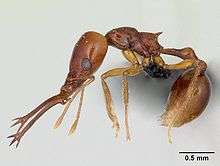 | |
| Acanthognathus teledectus worker | |
| Scientific classification | |
| Kingdom: | |
| Phylum: | |
| Class: | |
| Order: | |
| Family: | |
| Subfamily: | |
| Tribe: | |
| Genus: | Acanthognathus |
| Type species | |
| Acanthognathus ocellatus Mayr, 1887 | |
Description
They are reddish in colour and have long trap-jaws that can be compared to those of Odontomachus. These predatory ants live in small colonies that typically consist of less than 30 adults.[2]
Taxonomy
The genus was established by Mayr (1887) to house the species A. ocellatus, described from a single worker found in Brazil.[4]
Mistakenly, the name Acanthognathus was re-used by German ichthyologist G. Duncker in 1912 for a genus of syngnathid fish,[5] but that is invalid as it is a junior homonym.[6] These are now placed in either Dunckerocampus or Doryrhamphus, as the former sometimes is considered a subgenus of the latter.[7][8] To further confuse, a genus of nemesiid spiders, Acanthogonatus, is frequently misspelled Acanthognathus.
List of species
| Scientific name[3] | Authority | Picture |
|---|---|---|
| Acanthognathus brevicornis | M. R. Smith, 1944 | 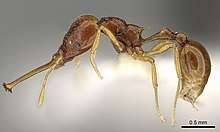 |
| Acanthognathus laevigatus | Galvis & Fernández, 2009[4] | |
| Acanthognathus lentus | Mann, 1922 | 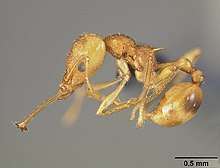 |
| Acanthognathus ocellatus | Mayr, 1887 | 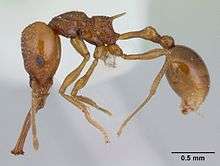 |
| †Acanthognathus poinari | Baroni Urbani & De Andrade, 1994[9] | |
| Acanthognathus rudis | Brown & Kempf, 1969 | 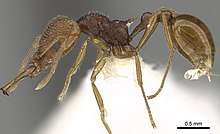 |
| Acanthognathus stipulosus | Brown & Kempf, 1969 | |
| Acanthognathus teledectus | Brown & Kempf, 1969 |  |
References
- Mayr, G. (1887). Südamerikanische Formiciden. Verhandlungen der Zoologisch-Botanischen Gesellschaft in Wien 37: 511-632.
- Brown, W. L., Jr., & W. W. Kempf (1969). A Revision of the Neotropical Dacetine Ant Genus Acanthognathus (Hymenoptera: Formicidae. Psyche 76(2): 87-109.
- Bolton, B. (2014). "Acanthognathus". AntCat. Retrieved 20 July 2014.
- Galvis, J. P.; Fernández, F. (2009). "Ants of Colombia X. Acanthognathus with the description of a new species (Hymenoptera: Formicidae)". Revista Colombiana de Entomología. 35: 245–249.
- Duncker, G. (1912). Die Gattungen der Syngnathidae. Mitteilungen Naturhist. Museum Hamburg 29: 219-240.
- Ride, W.D.L, H.G. Cogger, C. Dupuis, O. Kraus, A. Minelli, F. C. Thompson & P.K. Tubbs, eds. (1999). International Code of Zoological Nomenclature. 4th edition. International Trust for Zoological Nomenclature. ISBN 0-85301-006-4
- Whitley, G. P. (1933). Studies in ichthyology. No. 7. Records of the Australian Museum v. 19 (1): 60-112, Pls. 11-15.
- Dawson, C. E. (1985). Indo-Pacific pipefishes (Red Sea to the Americas). Gulf Coast Research Lab., Ocean Springs, Mississippi. Indo-Pacific pipefishes (Red Sea to the Americas). i-vi + 1-230.
- Baroni Urbani, C., & De Andrade, M. L. (1994). First description of fossil Dacetini ants with a critical analysis of the current classification of the tribe (Amber Collection Stuttgart: Hymenoptera, Formicidae. VI: Dacetini). Stuttg. Beitr. Naturkd. Ser. B ((page 12-15, Strumigenys senior synonym of Quadristruma).
External links

